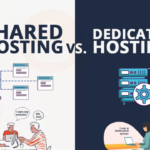Best Hosting for Web Developers
- By -Daisy
- Posted on
- Posted in Web Hosting
For web developers, choosing the right hosting is crucial to ensure fast load times, scalability, security, and flexibility to develop, test, and deploy websites or applications. With numerous hosting options available, it’s important to understand which type best aligns with your specific development needs, whether you’re building a personal blog, an e-commerce site, or a complex web application. In this guide, we’ll explore the best hosting solutions for web developers, highlighting the features, pros, and cons of different hosting types. From shared hosting to cloud hosting and managed services, the goal is to help you make an informed decision on the best platform for your development projects.

Shared Hosting
Best For: Beginners, small projects, and personal websites
Shared hosting is the most affordable option where multiple websites share the same server resources. While it’s a great choice for beginners or simple projects, it does come with limitations in terms of performance, speed, and resources. However, it is an ideal choice for developers who need an inexpensive option to host small websites and don’t need extensive server configuration.
Popular Providers:
- Bluehost
- HostGator
- SiteGround
Pros:
- Budget-friendly
- Easy to use with built-in tools like website builders
- Pre-installed CMS platforms like WordPress for quicker deployment
Cons:
- Limited resources shared with other websites
- Slower website speed and performance under heavy traffic
- Less control over server settings
VPS (Virtual Private Server) Hosting
Best For: Developers who need more control and dedicated resources
VPS hosting provides more resources and greater flexibility than shared hosting. Although the server is still shared, you have your own virtualized space, offering more control over the environment. VPS hosting is ideal for developers working on more resource-demanding websites or applications that require greater customization.
Popular Providers:
- DigitalOcean
- Linode
- Vultr
Pros:
- More control over server settings and configurations
- Improved performance compared to shared hosting
- Greater customization options (you can install any software you need)
Cons:
- More expensive than shared hosting
- Requires technical knowledge to manage and configure the server
- Not fully isolated, so performance can still be impacted by other users
Cloud Hosting
Best For: Scalable, high-traffic websites, and apps
Cloud hosting is an excellent solution for web developers who need flexibility and scalability. With cloud hosting, your website is hosted across multiple virtual servers, ensuring redundancy and the ability to handle spikes in traffic without downtime. This makes it a popular choice for developers working on high-performance websites or web applications that require high availability and scalability.
Popular Providers:
- Amazon Web Services (AWS)
- Google Cloud Platform (GCP)
- Microsoft Azure
Pros:
- Easily scalable resources based on traffic needs
- High uptime and performance reliability
- Advanced features such as auto-scaling, load balancing, and content delivery networks (CDNs)
Cons:
- Pricing can be complex and based on resource usage
- More difficult to set up and manage without prior experience
- Requires more monitoring and management compared to shared hosting
Dedicated Hosting
Best For: High-traffic websites and custom server configurations
Dedicated hosting gives you an entire physical server dedicated solely to your website or project. This offers the highest level of control, customization, and performance. Dedicated hosting is best suited for web developers managing large websites or applications with high traffic demands, complex configurations, or specialized server needs.
Popular Providers:
- InMotion Hosting
- Liquid Web
- A2 Hosting
Pros:
- Full control over the server and its resources
- Excellent performance and speed
- Ideal for resource-intensive projects
Cons:
- Expensive compared to other hosting options
- Requires technical expertise to configure and manage
- Overkill for small websites or low-traffic projects
Conclusion
Choosing the best hosting solution depends on your project’s needs, budget, and the level of control and flexibility you require. For beginner web developers or personal projects, shared hosting or managed WordPress hosting might be the way to go. For developers handling more complex or resource-demanding applications, VPS, cloud hosting, or dedicated hosting are better options.
Ultimately, consider factors such as server management, scalability, performance, and pricing when selecting a hosting solution. The right hosting platform will make your web development process smoother and ensure your website or application performs optimally.



